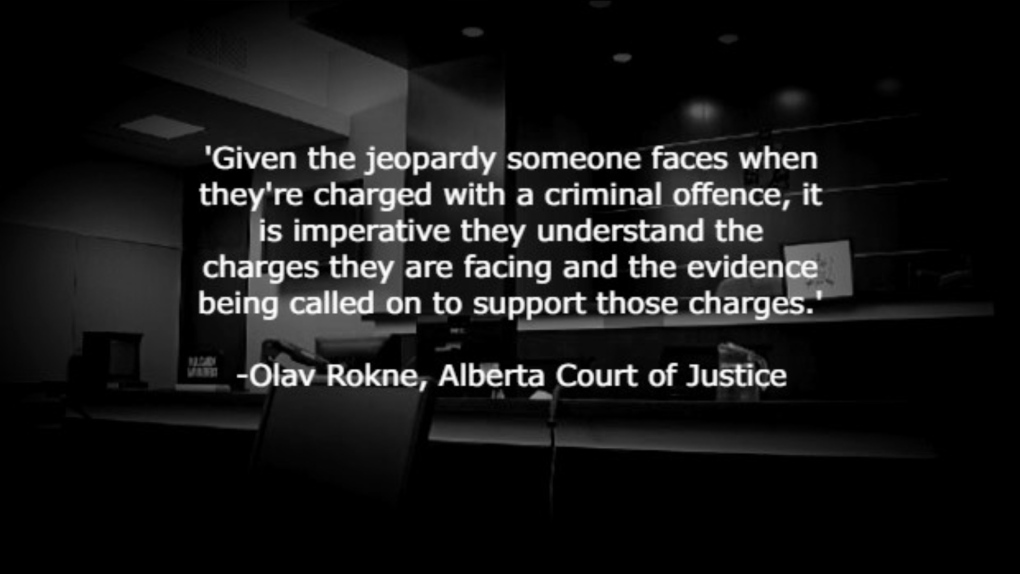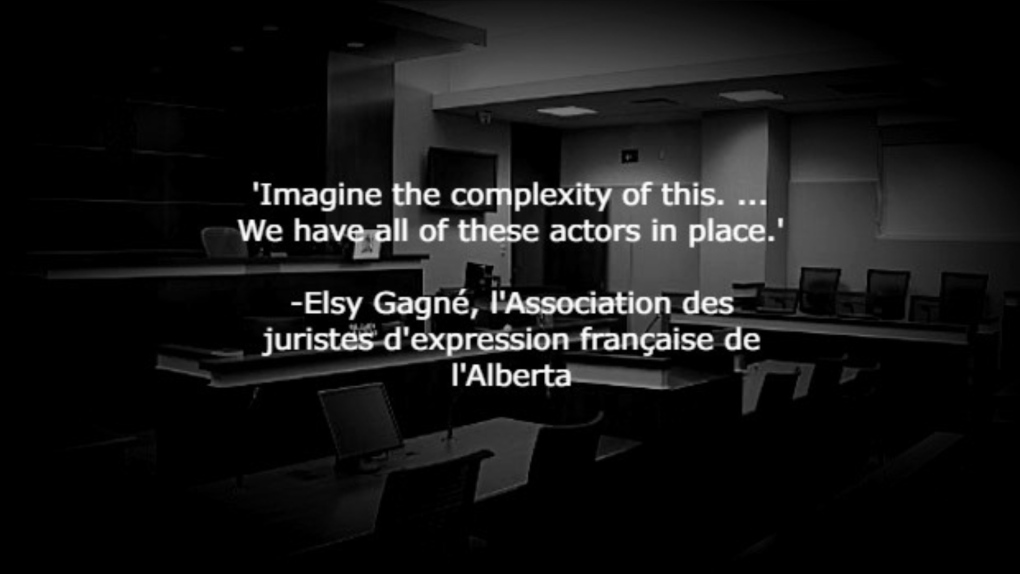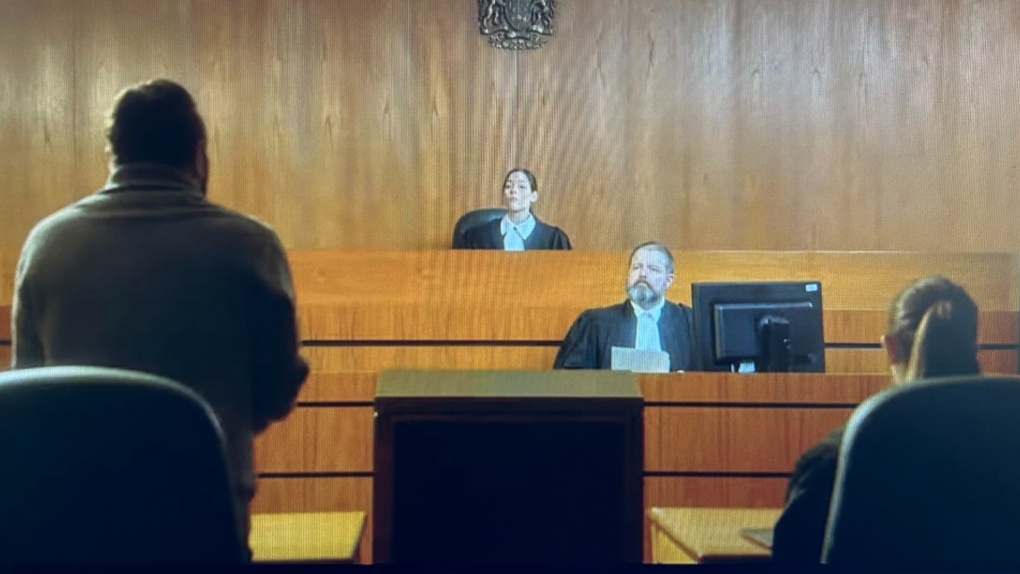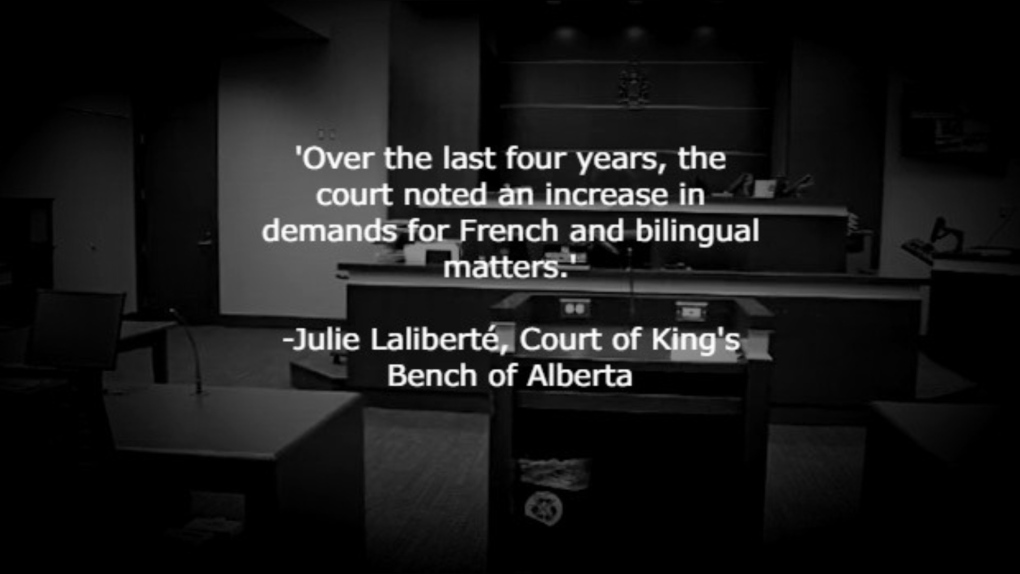A Canadian accused can stand trial in English or French. That can get complicated, but is seen as crucial
 Little of Richard Robert Mantha's trial will be in English. The 59-year-old's proceedings will be held in French – by his request and as is his right.
Little of Richard Robert Mantha's trial will be in English. The 59-year-old's proceedings will be held in French – by his request and as is his right.
Soon, Richard Robert Mantha will walk into a Calgary courtroom to face allegations of kidnapping, rape and more.
Little of the 59-year-old's trial will be in English.
Mantha's proceedings will be held in French – by his request and as is his right.
Section 530 of the Criminal Code guarantees the right to have a trial in either of the country's official languages.
"Given the jeopardy someone faces when they're charged with a criminal offence, it is imperative they understand the charges they're facing and the evidence being called on to support those charges," says Olav Rokne, senior communications adviser for the Alberta Court of Justice.
"And they need to know the evidence – including the defence they might be advancing – is fully understood by the presiding justice."
Elsy Gagné, president of the French-Speaking Legal Professionals Association of Alberta and a lawyer at Calgary Family Law Associates, tells CTV News Calgary that Section 530 "is crucial."

PARLANCE PROCESS
The Alberta Court of Justice and the Court of King's Bench of Alberta each have web pages set up for an accused individual to make a request for a French trial.
The Alberta Court of Justice web page can be found at albertacourts.ca/cj/about-the-court/audience-en-francais, while the Court of King's Bench of Alberta web page, meanwhile, can be found at albertacourts.ca/kb/about/francais-a-la-cour/audience-en-francais.
The accused makes the request.
However, Rokne says judges "can and probably do" make the suggestion when they see a need.
Julie Laliberté, counsel for French and interpretation services with the Court of King's Bench of Alberta, says KB likewise "institutes a proactive approach and early outreach."
"The court developed a French-language policy which was adopted in 2020," she says.
"The policy requires the court to proactively offer services to French-speaking court users, for example, through a recording in criminal appearances court that advises people of their language rights as well as via an acknowledgment box on the form for the appointment of counsel, which confirms that the accused has been advised of their language rights."
Laliberté says in addition, information about language needs is sought on forms prior to booking a pre-trial conference, as well as on the initiating document for family docket court proceedings.
Everyone remains more or less responsible for what it would normally be responsible for… just in French.
"It starts and ends in French," Rokne says.
"All of the courtroom participants – the justice, the clerk, the sheriff, the Crown – they all need to be fluent in French.
"Some witnesses might not be able to speak French, and so translators will be required for them. (Otherwise), top to bottom, the trial would be in French."
Laliberté says when a translator is needed, that need "will be discussed with the parties prior to the commencement of their proceedings."
"Imagine the complexity of this," Gagné says. "We have all of these actors in place."
Logistics, Rokne says, is "the main thing we have to consider about conducting a trial in French," as "there are a limited number of legal practitioners in the province who have these language skills."
But it's about the needs of the accused, he says.
The province's Ministry of Justice tells CTV News Calgary, "The court has a French-language education program to ensure we have sufficient numbers of Justices and Justices of the Peace who are fully bilingual."
Laliberté says the Court of King's Bench of Alberta currently has "four judges and several clerks capable of running French or bilingual trials as well as access to Language Line, an on-call telephone interpretation service" and "bilingual staff members who also support the court."
Gagné says the association would always like to see more.
More judges, clerks and the like.
And also more lawyers.
She says, "All of our French lawyers are super busy in that regard."
"It's a work in progress," she says.
"We would like to have more (and) we're working to increase the number."

EDUCATION, OUTREACH
The French-Speaking Legal Professionals Association of Alberta, or l'Association des juristes d'expression française de l'Alberta, was created "to promote access to justice in French in Alberta."
The non-profit was born in 1990.
It’s been a registered Canadian charity since 2015.
On the association’s website, ajefa.ca, it says its role is "to inform Albertans of their rights and responsibilities by providing and delivering legal information to the general public and to special clients (schools, elders, newcomers, families...). It also aims at improving and facilitating access to justice and legal services in French in Alberta."
Education and outreach are large parts of the association’s ongoing work.
Otherwise, Gagné says, some people in need could fall through the cracks, as the association can only help those who find their way to them.
"They have to contact us," Gagné says. "But to contact us, they have to be aware (of us)."
The association has produced a video, Les droits linguistiques d'Antoine Beaudoin, illustrating the confusion a largely or entirely French-speaking accused might experience standing in an English courtroom.
"(Our lawyers) see that every day," Gagné says. "It's not something that's uncommon, as a lawyer, to see."
 (Courtesy of l'Association des juristes d'expression française de l'Alberta)
(Courtesy of l'Association des juristes d'expression française de l'Alberta)
BY THE NUMBERS
Pandemic years and another blip or two aside, Rokne says the number of requests for French trials to the Alberta Court of Justice, as well as the number of said requests that did or did not move forward, have been fairly consistent:
- 2022 saw eight French trials requested, four of which proceeded and four of which did not;
- 2021 saw 11 requests, five of which went forward and six of which did not;
- 2020 saw 16 requests, five of which went forward and 11 of which did not;
- 2019 saw 20 requests, 17 of which went forward and three of which did not;
- 2018 saw 15 requests, 10 of which went forward and five of which did not;
- 2017 saw nine requests, six of which went forward and three of which did not;
- 2016 saw 22 requests, 10 of which went forward and 12 of which did not;
- 2015 saw 25 requests, 18 of which went forward and seven of which did not;
- 2014 saw 11 requests, 10 of which went forward and one of which did not;
- 2013 saw 15 requests, all 15 of which went forward;
- 2012 saw 16 requests, eight of which went forward and eight of which did not;
- 2011 saw 16 requests, 11 of which went forward and five of which did not; and
- 2010 saw 23 requests, 15 of which went forward and eight of which did not.
"It appears pretty stable," Rokne says. "If there is a trend, it has to do with population growth.
"Section 530 entered the Criminal Code in 1985. Since 1985, trials in French have taken place on a fairly regular basis. However, there were French language trials in Alberta prior to that. … I believe at least one trial in the ’50s was mostly in French," he says.
"We might have a mostly French trial or a trial in which French was used but it was only used for certain circumstances.
"Section 530 in 1985 is where we can say, definitively, French trials have been taking place since then – fully French trials have been taking place since then. (Before that), it would be case by case – discretion of the court."
Meanwhile, Laliberté says the Court of King’s Bench of Alberta’s numbers are climbing:
- 2023 to date has seen more than 25 requests;
- 2022 saw 25 requests;
- 2021 saw 20 requests;
- The last six months of 2020 saw a dozen requests; and
- Prior to 2020, there were a couple per year.
"Over the last four years, the court noted an increase in demands for French and bilingual matters," Laliberté tells CTV News Calgary.
Laliberté says it's unclear why KB’s numbers spiked through the pandemic.

MANTHA'S MATTER
As it is currently set, Mantha will go to trial later this month, on Jan. 15.
Mantha, who allegedly also goes by "Poncho", faces numerous charges involving five women who claim to have been drugged, choked, held at gunpoint, raped and stabbed.
Mantha is accused of targeting sex workers, bringing them to a Quonset hut on a property in Rocky View County between Chestermere and Langdon, Alta.
Among the charges against Mantha are kidnapping, forcible confinement, sexual assault with a weapon, sexual assault causing bodily harm and administering a noxious substance.
Allegations against Mantha have yet to be proven in court.
He was charged after officers cordoned off the property east of Calgary in April 2023.
Police brought in cadaver dogs during the search of the property but said then no bodies were found.
CTVNews.ca Top Stories

Canada closes 'flagpoling' loophole for temporary visa holders
Temporary residents of Canada will no longer be able to utilise the flagpoling process to initiate work or study permits, following a ban from the Canada Border Services Agency.
Kieran Culkin, 'Shōgun,' Ali Wong win at Golden Globes
The Golden Globes, which host Nikki Glaser introduced as “Ozempic's biggest night,” got underway Sunday with awards spread around for “Emilia Pérez," “A Real Pain," and “Conclave," as Hollywood's thus-far unpredictable awards season remained hard to pin in the early going.
Driver who entered Canada 'without stopping' at B.C. border crossing arrested: police
A man who illegally blew through the Canada-U.S. border crossing in Surrey, B.C., Sunday morning has been arrested, according to authorities.
'Absolutely devastating': Southern Manitoba golf course clubhouse burns for second time in 4 years
A golf course clubhouse in Morden, Man. went up in flames Sunday for the second time in less than four years, and mere days after its reopening from the previous fire was celebrated.
Thousands are without power due to winter storm hitting Newfoundland and Labrador
Massive waves slammed Newfoundland and Labrador's coastline on Sunday, as a powerful winter storm left thousands without power.
Man responsible for New Year's truck attack previously visited New Orleans, Ontario, Egypt: FBI
The man responsible for the truck attack in New Orleans on New Year's Day that killed 14 people visited the city twice before and recorded video of the French Quarter with hands-free glasses, an FBI official said Sunday.
The Vivienne, star of 'RuPaul's Drag Race UK', dies at 32
British reality show 'RuPaul's Drag Race UK' winner James Lee Williams, aged 32, popularly known as The Vivienne, has died.
Driving into Manhattan? That'll cost you, as new congestion toll starts Sunday
New York’s new toll for drivers entering the center of Manhattan debuted Sunday, meaning many people will pay US$9 to access its busiest part in peak hours.
WATCH Woman critically injured in explosive Ottawa crash caught on camera
Dashcam footage sent to CTV News shows a vehicle travelling at a high rate of speed in the wrong direction before striking and damaging a hydro pole.

































